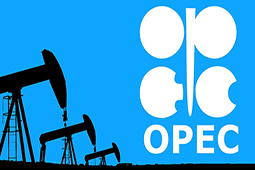
Iran Exempt from OPEC 1.2m bpd Output Cut


Iran is exempt from the output cut deal, Iran Oil Minister Bijan Namdar Zanganeh told reports following the meeting.
The deal was reached after Iran was granted an exemption from curbing its output due to US sanctions, which have already sharply reduced the nation’s oil shipments.
Oil prices jumped more than 5% on Friday as big Middle East producers in OPEC agreed to reduce output to drain global fuel inventories and support the market.
Benchmark Brent crude oil rose $3.26 a barrel to a high of $63.32. In early trade, Brent had fallen below $60 when it looked as if oil exporters might not agree.
US light crude rose $2.62 to a high of $54.11 a barrel before slipping to around $53.90.
Zanganeh said earlier that as a founder member of the Organization of the Petroleum Exporting Countries, Iran will carry on its activities within the half-a-century old group.
Speaking on the sidelines of the 175th OPEC conference in Vienna on Friday, Zanganeh told reporters, "As long as the US unilateral sanctions on our country do not end, we will not join any agreements to cut crude production even by a single barrel," ILNA reported.
OPEC oil ministers met at its headquarters in Vienna, Austria on Dec. 6 and 7 and held talks with allied oil-producing nations, namely Russia.
Brent crude has dropped to below $60 per barrel after reaching $86 per barrel in October amid concerns about oversupply and slowing global demand.
"We will seek an exemption from OPEC proposals to cut production," he said, noting that a price between $60 and $70 per barrel would suit Iran.
According to S&P Global Platts, Iran is facing limitations on its oil output because of US sanctions, which have already reduced its output to below 3 million barrels per day in November. Iran oil exports stood at 1.1 million bpd last month.
"I think other [OPEC] members should understand our situation and we expect them to collaborate with us. It is the minimum cooperation," said Zanganeh.
He told reporters that despite calls by US President Donald Trump not to cut curb production, OPEC wants to cut output by at least 1 million bpd to lift plummeting crude oil prices.
Russia and OPEC will come to an agreement on production cuts sooner or later, he was quoted as saying.
"It is not Iran's responsibility to manage the oil glut. Those who have flooded the market should shoulder the responsibility."
Iranian oil officials including Zanganeh and Kazem Gharibabadi, the permanent envoy to Vienna-based international organizations, say OPEC should neutralize the plots of countries trying to politicize the half-century-old oil organization.
Saudi Energy Minister Khalid al-Falih had warned last week that OPEC+ will not reach an accord to cut output unless all members, including Iran, are on board. He stressed that the group would consider Trump's request on the issue and also the needs of oil consumers.
Trump has asked OPEC not to lower production simply because it would raise prices. Reuters has reported that the organization has agreed to cut output but details have not been announced.
Accusing the Saudis and Russia of taking advantage of the unjust restrictions on Iran's market share, Zanganeh said, "OPEC is not a subsidiary of the US Department of Energy to submit to its policies. I think its members are mature enough to decide on the basis of their own national interests."


Trump weighs using $2 billion in CHIPS Act funding for critical minerals

Codelco cuts 2025 copper forecast after El Teniente mine collapse

Electra converts debt, launches $30M raise to jumpstart stalled cobalt refinery

Barrick’s Reko Diq in line for $410M ADB backing

Abcourt readies Sleeping Giant mill to pour first gold since 2014

Nevada army depot to serve as base for first US strategic minerals stockpile

SQM boosts lithium supply plans as prices flick higher

Viridis unveils 200Mt initial reserve for Brazil rare earth project

Tailings could meet much of US critical mineral demand – study

Kyrgyzstan kicks off underground gold mining at Kumtor

Kyrgyzstan kicks off underground gold mining at Kumtor

KoBold Metals granted lithium exploration rights in Congo

Freeport Indonesia to wrap up Gresik plant repairs by early September

Energy Fuels soars on Vulcan Elements partnership

Northern Dynasty sticks to proposal in battle to lift Pebble mine veto

Giustra-backed mining firm teams up with informal miners in Colombia

Critical Metals signs agreement to supply rare earth to US government-funded facility

China extends rare earth controls to imported material

Galan Lithium proceeds with $13M financing for Argentina project

Kyrgyzstan kicks off underground gold mining at Kumtor

Freeport Indonesia to wrap up Gresik plant repairs by early September

Energy Fuels soars on Vulcan Elements partnership

Northern Dynasty sticks to proposal in battle to lift Pebble mine veto

Giustra-backed mining firm teams up with informal miners in Colombia

Critical Metals signs agreement to supply rare earth to US government-funded facility

China extends rare earth controls to imported material

Galan Lithium proceeds with $13M financing for Argentina project

Silver price touches $39 as market weighs rate cut outlook

















